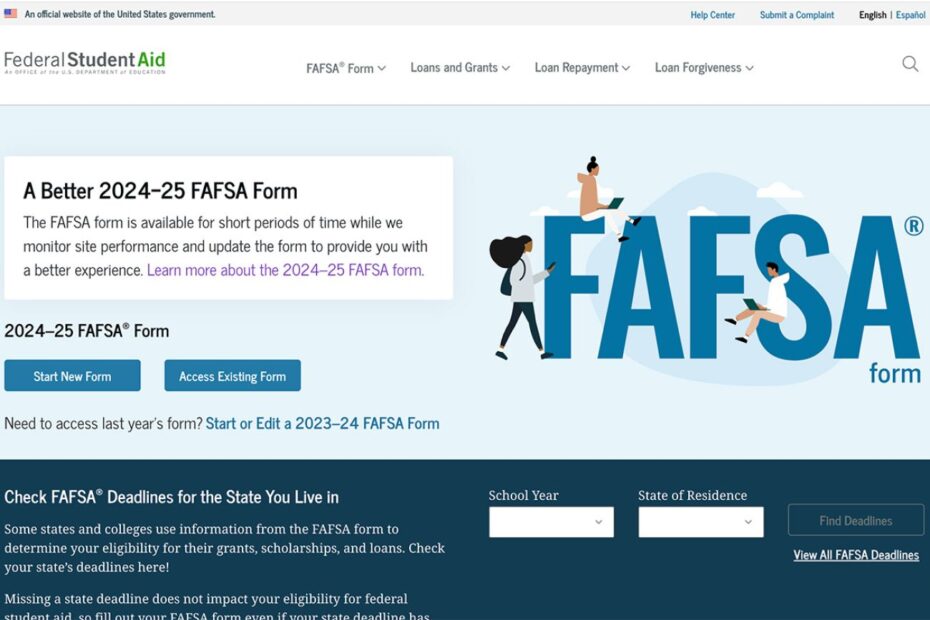Spoiler Alert: Yes, and Here’s Why
Let’s talk about FAFSA—the Free Application for Federal Student Aid. Maybe you’ve heard whispers of its importance in high school assemblies, or maybe your parents keep sliding it into conversations between “pass the salt” and “when’s your college essay due?” Either way, if you’re asking yourself, “Does the FAFSA really matter?” buckle up, because we’re about to dive into this financial aid wonderland with a blend of humor, wisdom, and real talk.
What Is FAFSA and Why Is Everyone Obsessed with It?
FAFSA stands for Free Application for Federal Student Aid, and it’s your golden ticket to potentially scoring federal grants, loans, and work-study funds to help pay for college. Basically, it’s the government’s way of saying, “Hey, we might be able to help you afford those overpriced textbooks and midnight pizza runs.”
But here’s the kicker: FAFSA doesn’t just determine federal aid. Many states, colleges, and even some private scholarship programs use your FAFSA information to decide how much money they’re willing to toss your way. Think of it as the ultimate financial aid resume. The more impressive (or desperate) your application, the more likely you are to get support.
Debunking the Excuses Not to Fill Out the FAFSA
Let’s address some common reasons people think FAFSA doesn’t matter—and promptly squash them like a bad financial decision:
- “I won’t qualify for aid.” Are you sure about that? FAFSA eligibility criteria are broader than you might think. Even if you’re not eligible for need-based grants, you might qualify for low-interest federal loans or work-study programs. Plus, who doesn’t love a surprise windfall?
- “It’s too complicated.” Sure, FAFSA isn’t the most thrilling thing you’ll do this year, but it’s not rocket science either. With tools like IRS Data Retrieval and guides from financial aid offices, the process is smoother than ever. Pro tip: turn it into a family bonding activity! Nothing brings people together like deciphering tax jargon.
- “I’m taking a gap year.” Great for you! But don’t let that gap year become a “gap in funding.” You can fill out the FAFSA now and defer your aid package to the following year. Future-you will thank you.
- “My parents make too much money.” FAFSA isn’t just about your parents’ income. Factors like household size, number of siblings in college, and unique family circumstances also play a role. Plus, some schools require a completed FAFSA for merit-based scholarships, even if your Expected Family Contribution (EFC) is high.
The Perks of Filling Out the FAFSA
If you’re still not convinced, let’s sweeten the deal by highlighting what FAFSA can do for you:
- Free Money (Grants) Grants are the holy grail of financial aid because you don’t have to pay them back. Think Pell Grants, state grants, and institutional grants. FAFSA is your key to unlocking these funds.
- Work-Study Opportunities Want a campus job that fits around your class schedule and adds a line to your resume? Work-study programs often prioritize students with completed FAFSA forms.
- Low-Interest Loans Federal student loans come with perks like fixed interest rates and flexible repayment plans. They’re also more forgiving than private loans. Without FAFSA, you’re shutting the door on this option.
- Scholarship Eligibility Many scholarships require a completed FAFSA, even if they’re merit-based. Think of it as the gateway to more free money.
- Financial Literacy Practice Filling out the FAFSA teaches you a thing or two about money management, tax forms, and financial planning. It’s adulting-lite and a skillset you’ll need sooner than you think.
FAFSA 2025: What’s New?
Each year, FAFSA gets a little makeover, and 2025 is no exception. Here’s what you need to know:
- Simplified Form: The 2025 FAFSA is all about streamlining. Expect fewer questions and a friendlier user experience.
- Expanded Pell Grant Eligibility: Changes to income thresholds mean more families will qualify for Pell Grants. Translation: more free money!
- Changes in Reporting: Say goodbye to some of the trickier tax reporting requirements. FAFSA 2025 aims to reduce confusion and errors.
Tips for a Stress-Free FAFSA Experience
Filling out the FAFSA doesn’t have to be a marathon of frustration. Here’s how to make it as painless as possible:
- Gather Your Documents Early You’ll need your Social Security number, tax forms, and information about assets. Have them ready before you start.
- Use the IRS Data Retrieval Tool This tool imports your tax information directly into the FAFSA form, saving you time and headaches.
- Don’t Miss Deadlines Federal, state, and school deadlines vary. Mark your calendar and aim to file as early as possible. Procrastination and financial aid don’t mix well.
- Ask for Help Financial aid offices, online tutorials, and even FAFSA chat support are there to guide you. You’re not in this alone.
- Review Before Submitting Double-check your entries to avoid costly mistakes. It’s worth the extra 10 minutes.
Does FAFSA Really Matter? Final Verdict
In case you missed the memo, the answer is a resounding YES. Whether you’re aiming for grants, loans, work-study opportunities, or scholarship eligibility, FAFSA is the gateway to making college more affordable. Ignoring it is like leaving a treasure map untouched because you’re skeptical about the “X” marking the spot.
So, grab a cup of coffee, carve out an hour, and tackle the FAFSA. Your future self (and bank account) will thank you. Remember, the earlier you file, the better your chances of maximizing aid. Good luck, and may the financial aid odds be ever in your favor!
